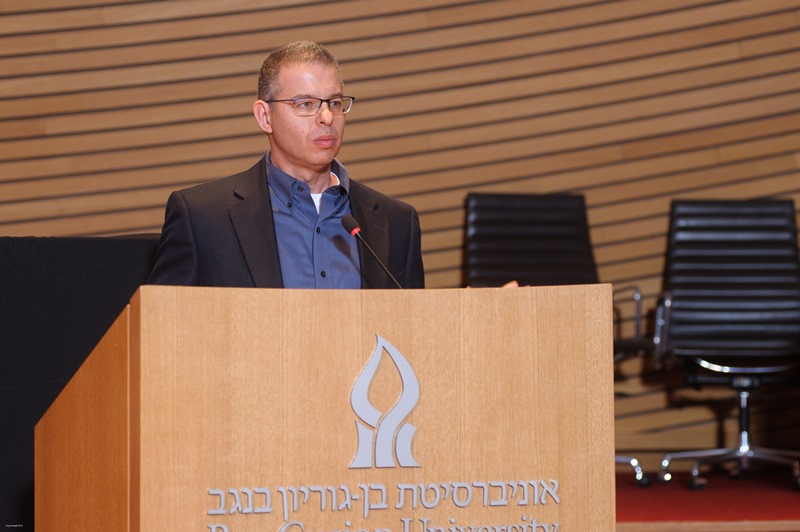
“I have always felt that the job of a journalist is not to tell people what to think. It is to tell them what to think ABOUT," Associated Press Bureau Chief for Israel and the Palestinian Territories Josef Federman (pictured above) told a rapt audience delivering the Robert St. John Chair in Objective Middle East Reporting Lecture. The lecture, entitled “Independent Journalism: An Uphill Struggle," offered a piercing analysis of the state of the media in the era of social media and “fake news."
“Thank you to everyone in this room for inviting me today and giving me this recognition. It is a huge honor and something I never expected. Many of you may not know that Robert St. John spent an important part of his career at the AP. That is just another reason why I was thrilled to accept this honor, and why the AP was so supportive," he said.
Despite painting a gloomy picture of the widening divide between Israelis and Palestinians in the 15 years since he joined the AP's office in Jerusalem, Federman is actually optimistic about the role of journalism these days.
“The news industry is one of the few professions where Israelis, Palestinians and foreigners all work together, as colleagues, committed hopefully to the same goal," he said, “The dozens of journalists covering this place may not agree on everything. But the combination of world-class journalistic standards, along with the insights a diverse staff can bring, hopefully provides a rich picture of what is going on here from all sides."
He outlined the dangers of social media's news feed – the “echo chambers" that show you only opinions with which you agree, the proliferation of fake news and sites parading as trusted news sources, as well as the drastic shift in advertising revenue to social media platforms which has doomed many a newspaper to the dustbin of history in recent years. He stressed, however, that he remains enthusiastic about the future of journalism.
“I'd like to tell you why I'm actually optimistic, why in many ways we are in a golden age of journalism. You see, journalists are a stubborn and hard-working bunch, a stiff-necked people as we might say in this part of the world. And we are not ready to roll over.
“In this world of information overload, people are looking for sources they can trust. That is what sets apart places like The Associated Press and other traditional media sources. The AP has an unmatched global footprint, with bureaus in virtually every country on the planet. And most important, we have standards, extremely high standards. That means that information must be reliable. We check and double check our sources of information, and we tightly restrict our use of anonymous sources. We consult and collaborate and have intense internal debates. I like to tell my own staff that as important as it is to break a story, I would rather be right than be first. If something doesn't feel right, make another call and speak to another source before running with it," he said, explaining his editorial philosophy.
“Like other large organizations, we have people who work on “fact checks," looking at the veracity of claims by politicians," he continued, “It is no accident that our fact checks, and those at other news organizations, are extremely popular with readers. People appreciate information they can rely on.
“So while we face obstacles like never before, today's generation of journalists is also reporting some of the best stories of our times. Look at the impact that places like The New York Times and the New Yorker had this year, by breaking the story of producer Harvey Weinstein and spawning the global #MeToo movement. Other Pulitzer Prize winners this year broke stories about Russian interference in the 2016 presidential election and the American opioid crisis. My colleagues at the AP were recognized for a series that showed the devastation wrought upon the northern Iraqi city of Mosul in the U.S. defeat of Islamic State fighters," Federman noted.
While the major news stories of the day are his bread and butter, “The stories that stick with me are the ones about individuals. About seven years ago, I took a ride to the town of Yokneam up north to write about a new program used to teach Arabic to Jewish Israeli schoolchildren. It turns out that for decades, in a country with a sizeable Arab population, most Israeli kids learned Arabic from Jewish teachers. I went to observe a program in which an Arab teacher was teaching Jewish kids her mother tongue.
“The scene was heartwarming. A young teacher, named Maram Afour, invited me into her classroom, and the kids absolutely adored her. Not only was she teaching the kids how to speak Arabic, she was teaching them about Arab culture, about Arab family life, about her children, about humanity. In her own way, she was breaking down all of those barriers that I spoke about earlier.
“Those are my favorite types of stories. Taking something small, like a classroom in a small town, and telling the world something bigger about modern Israel. That is what journalism is. Putting yourself in someone else's shoes, seeing things through their eyes, and hopefully enlightening the world just a little bit more about this amazing, infuriating, gut-wrenching, tragic and uplifting place. These are the types of stories you will never find on politicians' YouTube sites, and this is why I ask every one of you to encourage, and support and seek out good, objective and independent journalism," he concluded.
Federman mentioned that the AP archivists were quite enthusiastic about locating materials written by or about Robert St. John, of which he had printed out a sampling. One find, he had printed and framed: A photo of Robert St. John with David Ben-Gurion, which will be sent to St. John's stepdaughter in Washington D.C.